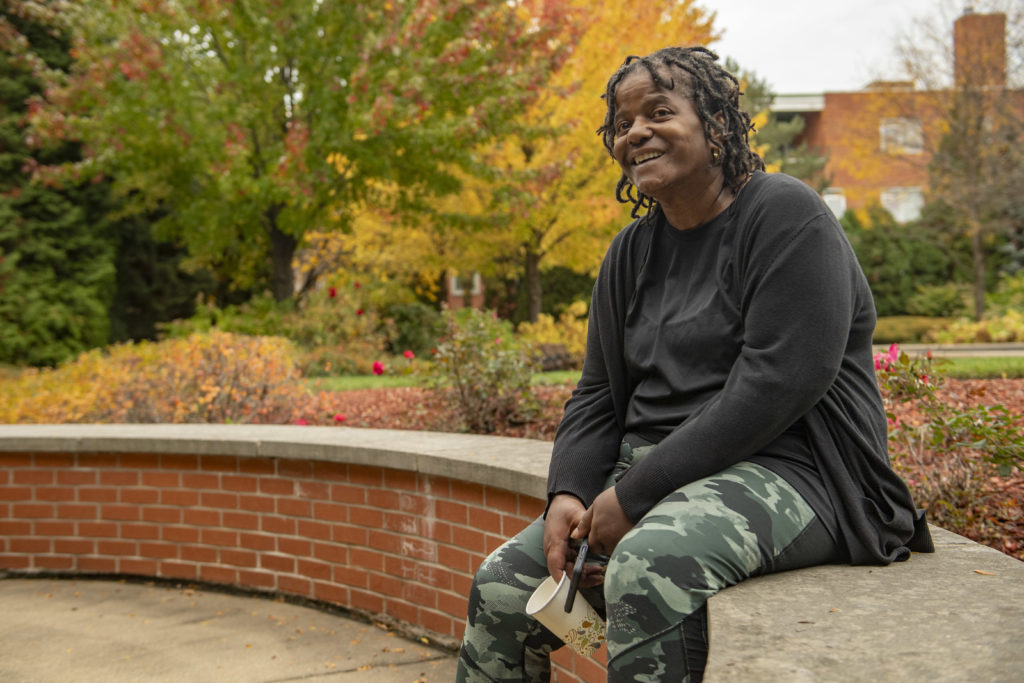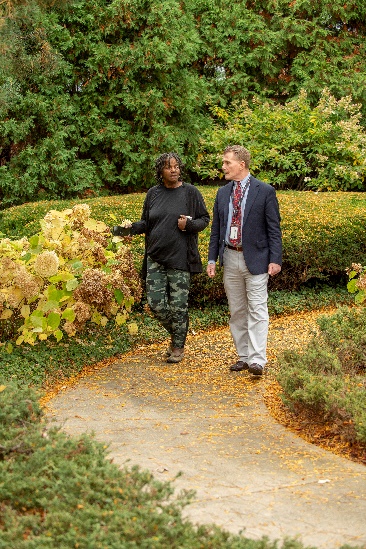
Unfolding trauma
Audrey is a sister. She is a mother and grandmother. She is an Army veteran. Audrey has survived repeated instances of violence. She has been homeless. She has served time in prison. Audrey has a great sense of humor, tells it like it is. She is a recovering addict and has been for 38 years. Audrey is what bravery looks like, a lesson in resilience.
In 1980, Audrey joined the military: a way to earn her college degree, try to escape memories of a traumatic childhood, get a fresh start. Sadly, that’s not the way her story unfolds.
For her, the military brought more trauma and is where her addiction began. In the years following, she was re-stationed in Europe, married, became pregnant, got sober, relapsed, divorced, got sober again. Found a good job. Earned the respect of her supervisors and coworkers. Things were looking up.
Then, in 2012, a car breakdown started a chain reaction, setting her life in a downward spiral. She didn’t have the money to fix her vehicle, and without it, she couldn’t get to work. She lost her job. Her criminal record stood in the way of finding a new one. Without work, she couldn’t pay her rent. It was just a matter of time before she became homeless.
She stayed on couches, in buildings under construction, in shelters and tents. In 2020, the pandemic struck. Her sister, the one stalwart family member and Audrey’s rock, became critically ill. The 51 days she was on a ventilator were the scariest days in Audrey’s life. “It was during this time of desperation that I found God again,” she recalls. “I prayed and prayed for my sister.”
Her sister recovered, and it was shortly after when Audrey learned about a program for recovering addicts, ultimately leading her to St. Leo Residence for Veterans, a place she credits with saving her life.

A new beginning at St. Leo
“No one who served our country should be without a home,” says St. Leo’s Director of Social Services David Dempsey.
St. Leo opened in Chicago’s Auburn-Gresham neighborhood in 2007, a joint project with the Veterans Administration (VA), Department of Housing and Urban Development (HUD) and Catholic Charities. The campus is comprised of 141 fully furnished studio apartments, expansive common recreational space, a computer lab, a fitness room, and multipurpose rooms for a variety of community meetings such as veteran-specific issues and substance abuse recovery groups. Also on the St. Leo Campus is the VA-operated Auburn Gresham VA outpatient clinic that provides medical and mental health services.
Upon acceptance into the program, each resident is assigned a Master’s-level clinical and case managers who helps devise a customized plan with self-identified goals to maintain housing, increase income through benefits and/or employment, and address other barriers to self-sufficiency.
With all these amenities and services under one roof, St. Leo currently is the only program of its kind in the nation. HUD-funded programs like St. Leo adhere to a “housing-first” approach: individuals and families experiencing homelessness are connected to permanent housing without preconditions and barriers to entry such as sobriety, treatment, or service participation requirements.
Supporting veterans to live independently
Saint Teresa of Calcutta once said, “Not all of us can do great things, but we can do small things with great love.” It’s with this spirit that David Dempsey approaches his job each day, inspired by residents like Audrey. “Despite everything she’s been through, she has a bubbly and optimistic personality. She manages her money and always pays her rent. She works hard to stay drug-free, to re-establish family connections, to live independently.”
In his nine-year tenure, David has been fortunate to witness many successes: veterans overcoming substance dependencies, histories of abuse and homelessness, to start new lives. “It is tough work, but my team loves coming here each day,” he says. “We get to witness the extraordinary resiliency and fortitude of our residents. They keep moving forward, keep striving.”
Audrey does aim to leave St. Leo in the future, “my next place is going to be my last and I want to make sure it’s right for me and that I’m ready.” In the meantime, she is deeply grateful for the support she receives here, describing her Case Manager Edgelle Pettigrew as “a force. She is outspoken, just like me. She has knowledge about addiction and holds me accountable while also providing the support and resources I need to pull myself together.”
Every minute of every day is a test of Audrey’s sobriety, and she is the first to admit, her path has been anything but direct, but “I get up in the morning and I thank God that I’m awake and in my own apartment. I don’t have to be out in the cold. I shouldn’t be alive, but I’ve had good people, God and angels in my life who have looked out for me.”
Visit Catholiccharities.net to learn more about St. Leo’s and our work with veterans.


